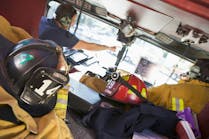Earlier this year, the fire chief of the Bel Air Volunteer Fire Company in Harford County, Md. suspended three firefighters and demoted a fourth over posts made on a member's Facebook page.
Dave Statter, a former TV news reporter in the Washington, D.C. area who now runs a blog focused on fire service issues, said Tuesday that Fire Chief Eddie Hopkins did the right thing by choosing to act quickly.
"The fire chief recognized instantly that there was a problem out there," he said during an IAFC webcast hosted by himself and fire service lawyer Curt Varone. "He handled it extremely well from a press standpoint and tried to mitigate some of the issues that were raised."
Statter and Varone said that incidents like this one highlight the need for fire departments to take a closer look at how they handle actions by their members on social media websites.
The initial Facebook post by the BVFC member on May 30 was rather tame:
"Even when myself and a full engine crew are in turnout gear at Sonic for lunch, the manager still says only police and military get discounts. Cool, thanks we appreciate the support."
It was the responses to the post that got the department's members in hot water.
One member commented: "Let's make sure they don't get a response," while another suggested they "go set the Dumpster on fire."
Statter said that the new generation of firefighters grew up with Facebook and Twitter, social media websites that didn't exist for previous generations.
"This is the way they were raised and everything they do has to be on social media," he said. "That doesn't necessarily jibe well with firefighting."
Firefighters are held to a higher standard than most professions, but Varone said that fire departments can't always control what their members do on their own time.
"You have this issue of off duty conduct," he said. "How much can you control off duty? Can we prevent our employees from engaging in social commentary just because some people find it offensive?"
Varone said that fire departments must have a clear policy that deals with social media and the consequences for disobeying the guidelines set in place.
He has written close to 100 policies for fire departments, and so far, he says none have been identical.
Not only do departments have to develop a policy that fits their own specific needs, but they also have to make sure that they review and update it every 3-6 months, according to Varone.
Both Statter and Varone agree that while fire departments must craft a good policy that deals with social media, education is a big part of the equation as well.
"It's going to take more than policy. You have to deal with the culture that is there and deal with the ethics of all of this and try to explain it to your people," Statter said.
"You need to teach people, you need to train them. You need to deal with the 'look at me generation.' "
Resources: Model Fire/EMS Social Media Policy (IAFC Members Only)





